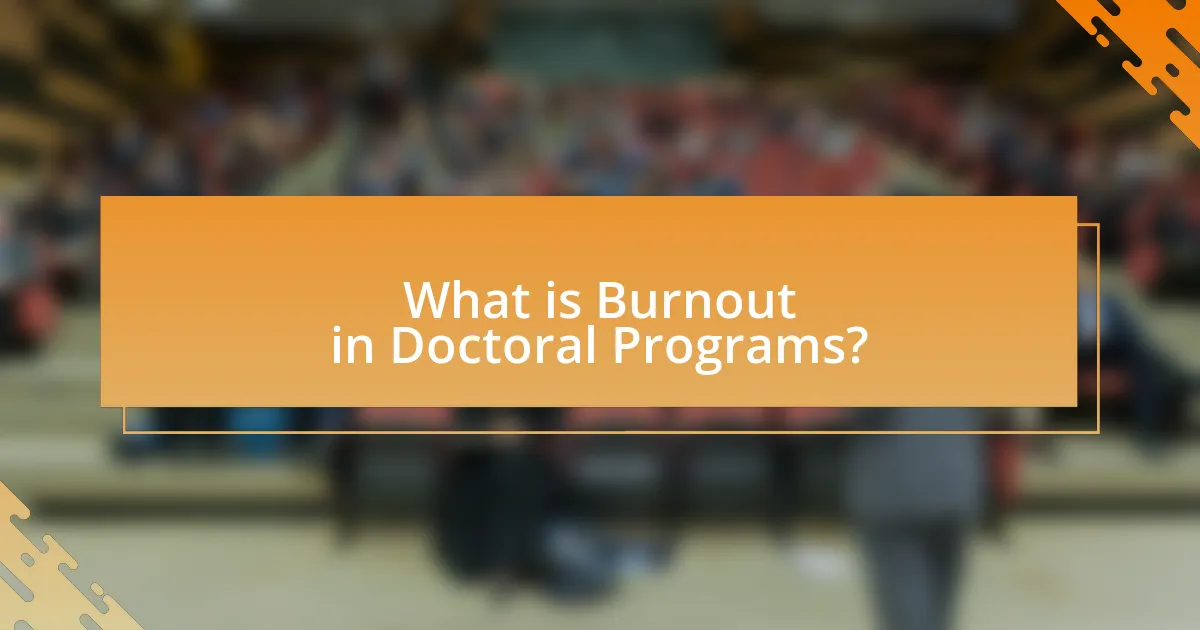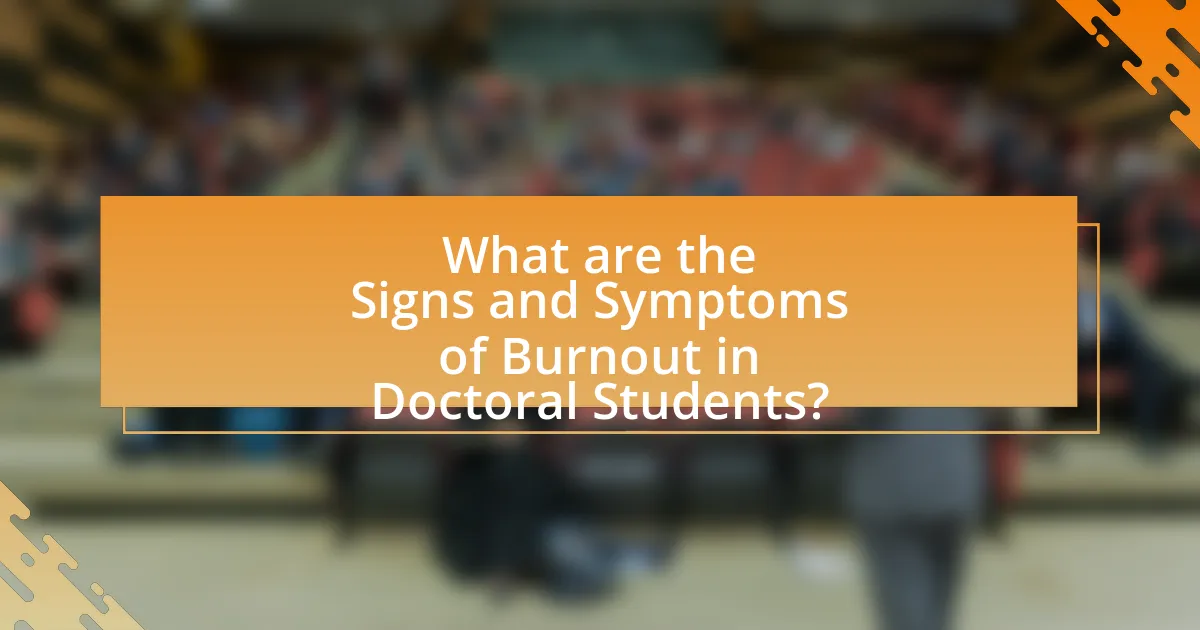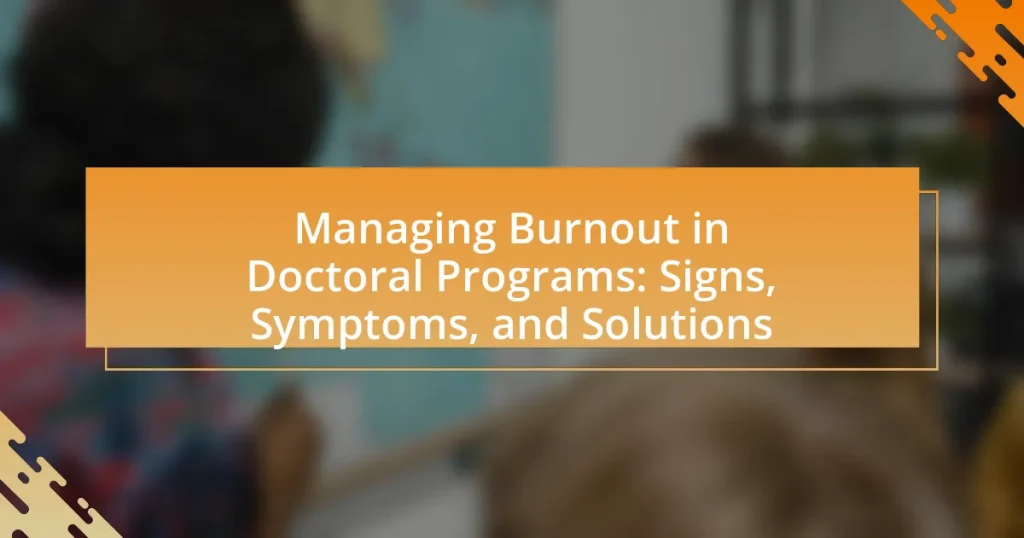Burnout in doctoral programs is a significant issue characterized by physical, emotional, and mental exhaustion due to prolonged academic stress. Approximately 40% of doctoral students experience burnout, which can lead to decreased motivation, feelings of inadequacy, and a decline in academic performance. Key characteristics include emotional exhaustion, depersonalization, and a reduced sense of personal accomplishment. The article explores the signs and symptoms of burnout, differentiates it from general stress, and emphasizes the importance of addressing this phenomenon to improve students’ mental health and academic success. It also outlines effective management strategies, including time management, self-care practices, and institutional support, to help mitigate burnout among doctoral candidates.

What is Burnout in Doctoral Programs?
Burnout in doctoral programs is a state of physical, emotional, and mental exhaustion caused by prolonged stress and demands associated with academic work. This phenomenon often manifests through feelings of inadequacy, decreased motivation, and a sense of detachment from one’s studies. Research indicates that approximately 40% of doctoral students experience significant levels of burnout, primarily due to high expectations, isolation, and the pressure to publish. These factors contribute to a decline in academic performance and overall well-being, highlighting the critical need for effective management strategies within doctoral programs.
How is burnout defined in the context of doctoral studies?
Burnout in the context of doctoral studies is defined as a state of chronic physical and emotional exhaustion, often accompanied by feelings of cynicism and reduced efficacy related to academic work. This phenomenon typically arises from prolonged stressors inherent in doctoral programs, such as high expectations, workload, and isolation. Research indicates that approximately 40% of doctoral students experience significant levels of burnout, which can negatively impact their academic performance and mental health.
What are the key characteristics of burnout among doctoral students?
The key characteristics of burnout among doctoral students include emotional exhaustion, depersonalization, and a reduced sense of personal accomplishment. Emotional exhaustion manifests as feelings of fatigue and depletion, often resulting from prolonged stress and workload. Depersonalization involves a sense of detachment from academic responsibilities and colleagues, leading to a cynical attitude towards one’s work. A reduced sense of personal accomplishment reflects feelings of ineffectiveness and a lack of achievement in academic pursuits. Research indicates that these characteristics can significantly impact students’ mental health and academic performance, with studies showing that up to 50% of doctoral students experience burnout at some point during their studies.
How does burnout differ from stress in academic settings?
Burnout in academic settings is a state of chronic physical and emotional exhaustion that results from prolonged stress, while stress itself is a temporary response to specific challenges or demands. Burnout manifests as feelings of hopelessness, detachment, and a lack of accomplishment, often leading to decreased motivation and productivity, whereas stress can be managed and alleviated through coping strategies and time management. Research indicates that burnout is characterized by a depletion of energy and a sense of ineffectiveness, which can significantly impact a student’s academic performance and mental health, as highlighted in studies on graduate student well-being.
Why is it important to address burnout in doctoral programs?
Addressing burnout in doctoral programs is crucial because it directly impacts students’ mental health, academic performance, and overall well-being. Research indicates that high levels of stress and burnout can lead to decreased productivity, increased dropout rates, and long-term psychological issues among doctoral candidates. For instance, a study published in the journal “Higher Education” found that nearly 40% of doctoral students reported experiencing significant levels of burnout, which correlates with lower completion rates and diminished academic success. Therefore, proactively managing burnout is essential to foster a healthier academic environment and improve retention and success rates in doctoral programs.
What impact does burnout have on academic performance?
Burnout significantly negatively impacts academic performance by reducing students’ motivation, concentration, and overall cognitive functioning. Research indicates that individuals experiencing burnout often report lower grades, decreased quality of work, and increased absenteeism. A study published in the Journal of Educational Psychology found that students with high levels of burnout had a 30% lower likelihood of achieving academic success compared to their peers with lower burnout levels. This decline in performance is attributed to the emotional exhaustion and depersonalization that characterize burnout, leading to disengagement from academic responsibilities and a diminished capacity to perform effectively in educational settings.
How does burnout affect mental health and well-being?
Burnout significantly deteriorates mental health and well-being by leading to chronic stress, anxiety, and depression. Research indicates that individuals experiencing burnout often report feelings of emotional exhaustion, reduced personal accomplishment, and depersonalization, which can exacerbate mental health issues. A study published in the Journal of Affective Disorders found that burnout is closely linked to increased rates of anxiety and depressive disorders among professionals, highlighting its detrimental impact on overall psychological well-being.

What are the Signs and Symptoms of Burnout in Doctoral Students?
The signs and symptoms of burnout in doctoral students include emotional exhaustion, depersonalization, and a reduced sense of personal accomplishment. Emotional exhaustion manifests as feelings of fatigue and being overwhelmed, while depersonalization involves a sense of detachment from academic responsibilities and colleagues. A reduced sense of personal accomplishment reflects feelings of ineffectiveness and a lack of achievement in their work. Research indicates that approximately 40% of doctoral students experience significant levels of burnout, highlighting the prevalence of these symptoms in this population.
What are the common signs of burnout in doctoral programs?
Common signs of burnout in doctoral programs include chronic fatigue, decreased motivation, and feelings of inadequacy. Chronic fatigue manifests as persistent exhaustion that does not improve with rest, while decreased motivation leads to a lack of interest in research and academic responsibilities. Feelings of inadequacy often result in self-doubt about one’s abilities and progress. Additionally, symptoms may include irritability, difficulty concentrating, and withdrawal from social interactions, which can further exacerbate the sense of isolation experienced by doctoral students. These signs are supported by research indicating that high levels of stress and workload contribute significantly to burnout in academic settings.
How can emotional exhaustion manifest in students?
Emotional exhaustion in students can manifest through symptoms such as chronic fatigue, decreased motivation, and feelings of helplessness. These symptoms often lead to a decline in academic performance and increased absenteeism. Research indicates that emotional exhaustion is linked to high levels of stress and can result in physical symptoms like headaches and sleep disturbances. A study published in the Journal of Educational Psychology found that students experiencing emotional exhaustion reported lower levels of engagement and higher levels of cynicism towards their studies, further validating the impact of emotional exhaustion on their overall well-being and academic success.
What physical symptoms may indicate burnout?
Physical symptoms that may indicate burnout include chronic fatigue, insomnia, headaches, gastrointestinal issues, and muscle tension. Chronic fatigue manifests as persistent exhaustion that does not improve with rest, while insomnia can lead to difficulty falling or staying asleep. Headaches may occur frequently, often tension-related, and gastrointestinal issues can include stomach pain or changes in appetite. Muscle tension typically presents as discomfort or tightness in various body parts. These symptoms are commonly reported in individuals experiencing burnout, as highlighted in research conducted by Maslach and Leiter, which emphasizes the physical toll of prolonged stress and emotional exhaustion.
How can one identify burnout early in doctoral studies?
One can identify burnout early in doctoral studies by recognizing specific signs such as chronic fatigue, decreased motivation, and feelings of inadequacy. These symptoms often manifest as persistent exhaustion that does not improve with rest, a lack of enthusiasm for research or academic responsibilities, and a sense of being overwhelmed by the demands of the program. Research indicates that early detection of these symptoms can lead to timely interventions, which are crucial for maintaining mental health and academic performance. For instance, a study published in the Journal of Higher Education found that students who reported high levels of stress and emotional exhaustion were more likely to experience burnout, highlighting the importance of monitoring these indicators closely.
What self-assessment tools can help recognize burnout symptoms?
Self-assessment tools that can help recognize burnout symptoms include the Maslach Burnout Inventory (MBI), the Copenhagen Burnout Inventory (CBI), and the Professional Quality of Life Scale (ProQOL). The Maslach Burnout Inventory is widely used in research and clinical settings to measure emotional exhaustion, depersonalization, and personal accomplishment, providing a comprehensive view of burnout levels. The Copenhagen Burnout Inventory focuses on personal, work-related, and client-related burnout, allowing individuals to assess their specific burnout sources. The Professional Quality of Life Scale evaluates both the positive and negative aspects of working in helping professions, including burnout and compassion satisfaction. These tools are validated and have been utilized in various studies to effectively identify burnout symptoms among professionals, including those in high-stress environments like doctoral programs.
How can peers and advisors help in identifying burnout?
Peers and advisors can help in identifying burnout by observing changes in behavior, performance, and emotional well-being. Peers may notice signs such as withdrawal from social interactions, decreased motivation, or increased irritability, which can indicate burnout. Advisors can provide structured feedback and regular check-ins, allowing them to assess a student’s workload and stress levels. Research indicates that social support from peers and mentors significantly correlates with reduced burnout rates, highlighting the importance of these relationships in recognizing early signs of distress.

What Solutions Exist for Managing Burnout in Doctoral Programs?
Solutions for managing burnout in doctoral programs include establishing a supportive network, implementing time management strategies, and utilizing mental health resources. A supportive network, such as peer groups or mentorship programs, provides emotional and academic assistance, which has been shown to reduce feelings of isolation and stress among doctoral students. Time management strategies, including setting realistic goals and prioritizing tasks, help students balance their workload effectively, thereby minimizing overwhelm. Additionally, accessing mental health resources, such as counseling services or workshops on stress management, can provide essential coping mechanisms and support. Research indicates that students who engage with these solutions report lower levels of burnout and improved overall well-being.
What strategies can doctoral students use to prevent burnout?
Doctoral students can prevent burnout by implementing effective time management, establishing a support network, and practicing self-care. Effective time management involves setting realistic goals and prioritizing tasks, which helps reduce feelings of overwhelm. Establishing a support network, including peers, mentors, and advisors, provides emotional and academic support, fostering resilience. Practicing self-care, such as regular exercise, adequate sleep, and mindfulness techniques, has been shown to improve mental health and reduce stress levels, as evidenced by research indicating that self-care practices can significantly lower burnout rates among graduate students.
How can time management techniques reduce the risk of burnout?
Time management techniques can significantly reduce the risk of burnout by promoting a balanced workload and enhancing productivity. Effective time management allows individuals to prioritize tasks, set realistic deadlines, and allocate specific time slots for work and rest, which helps prevent overwhelming feelings associated with excessive workload. Research indicates that structured time management practices, such as the Pomodoro Technique, can improve focus and reduce stress levels, thereby mitigating burnout. A study published in the Journal of Educational Psychology found that students who employed time management strategies reported lower levels of stress and higher academic performance, demonstrating the effectiveness of these techniques in managing workload and emotional well-being.
What role does self-care play in managing academic stress?
Self-care plays a crucial role in managing academic stress by promoting mental and physical well-being, which directly impacts a student’s ability to cope with the demands of their studies. Engaging in self-care activities, such as regular exercise, adequate sleep, and mindfulness practices, has been shown to reduce anxiety and improve overall mood, thereby enhancing academic performance. Research indicates that students who prioritize self-care report lower levels of stress and higher levels of satisfaction in their academic pursuits, as evidenced by a study published in the Journal of American College Health, which found that self-care practices significantly correlate with reduced stress levels among college students.
What institutional support is available for doctoral students experiencing burnout?
Institutional support for doctoral students experiencing burnout includes counseling services, wellness programs, and academic accommodations. Universities typically offer mental health resources, such as access to licensed counselors who specialize in student issues, which can help students manage stress and emotional fatigue. Additionally, wellness programs may provide workshops on stress management, mindfulness, and work-life balance, aimed at equipping students with coping strategies. Academic accommodations, such as flexible deadlines or reduced course loads, can also be arranged to alleviate pressure and allow students to focus on their mental health. These supports are designed to address the unique challenges faced by doctoral students and promote their overall well-being.
How can universities create a supportive environment for students?
Universities can create a supportive environment for students by implementing comprehensive mental health resources and fostering a culture of open communication. Providing access to counseling services, stress management workshops, and peer support groups directly addresses the mental health needs of students, which is crucial in managing burnout, particularly in high-pressure programs like doctoral studies. Research indicates that institutions with robust mental health initiatives see a significant reduction in student burnout rates, as these resources empower students to seek help and develop coping strategies. Additionally, promoting a culture where students feel comfortable discussing their challenges with faculty and peers enhances their sense of belonging and support, further mitigating feelings of isolation and stress.
What resources are typically offered to help manage burnout?
Resources typically offered to help manage burnout include counseling services, stress management workshops, peer support groups, and mindfulness training. Counseling services provide individualized support to address emotional and psychological challenges, while stress management workshops equip individuals with practical techniques to cope with stressors. Peer support groups foster a sense of community and shared experience, allowing individuals to discuss their challenges openly. Mindfulness training promotes relaxation and mental clarity, which can significantly reduce feelings of burnout. These resources are often provided by academic institutions to support the well-being of doctoral students.
What are some practical tips for managing burnout effectively?
To manage burnout effectively, individuals should prioritize self-care, establish boundaries, and seek support. Self-care practices, such as regular exercise, adequate sleep, and mindfulness techniques, have been shown to reduce stress and improve overall well-being. Establishing boundaries involves setting limits on work hours and learning to say no to additional responsibilities, which helps prevent overwhelm. Seeking support from peers, mentors, or mental health professionals can provide valuable perspectives and coping strategies. Research indicates that social support is linked to lower levels of burnout, highlighting its importance in maintaining mental health during demanding periods, such as doctoral programs.
How can setting realistic goals help in reducing burnout?
Setting realistic goals can significantly reduce burnout by providing clear, achievable targets that enhance motivation and focus. When individuals set attainable objectives, they experience a sense of accomplishment, which boosts their self-efficacy and reduces feelings of overwhelm. Research indicates that goal-setting theory, as proposed by Edwin Locke, demonstrates that specific and challenging goals lead to higher performance and satisfaction. Furthermore, a study published in the Journal of Educational Psychology found that students who set realistic academic goals reported lower stress levels and higher overall well-being. This evidence supports the notion that realistic goal-setting is a practical strategy for mitigating burnout, particularly in high-pressure environments like doctoral programs.
What role does seeking professional help play in recovery from burnout?
Seeking professional help is crucial in the recovery from burnout as it provides individuals with tailored strategies and support to address their specific challenges. Professionals, such as therapists or counselors, can offer evidence-based interventions that help individuals identify the root causes of their burnout, develop coping mechanisms, and restore their mental well-being. Research indicates that therapy can significantly reduce symptoms of burnout, with studies showing that cognitive-behavioral therapy (CBT) leads to improved emotional regulation and resilience in those experiencing burnout. Thus, engaging with a professional not only facilitates recovery but also equips individuals with tools to prevent future occurrences of burnout.



